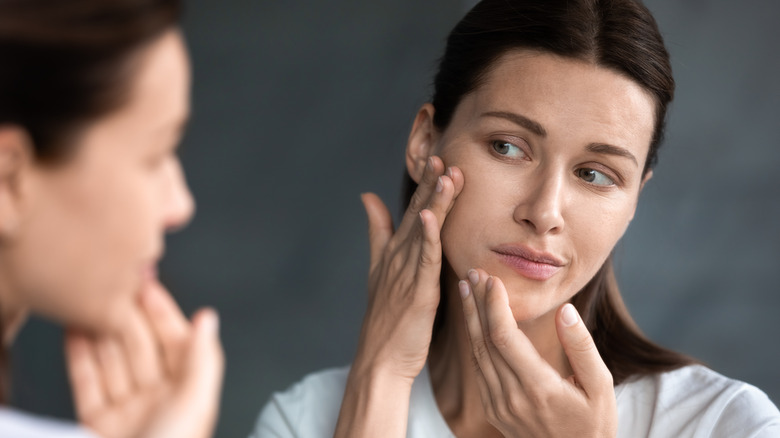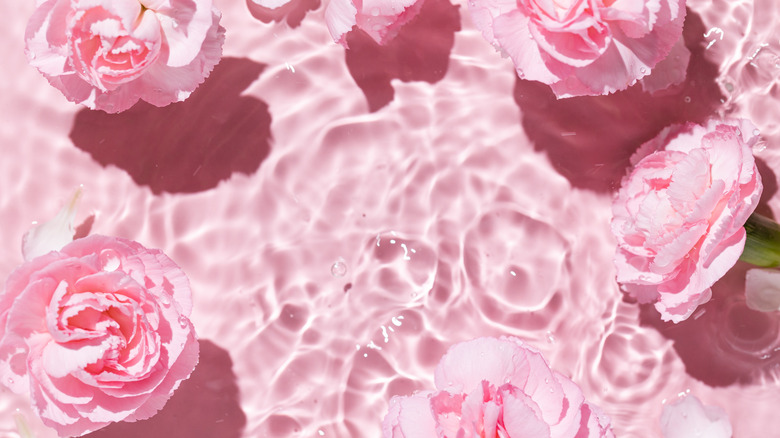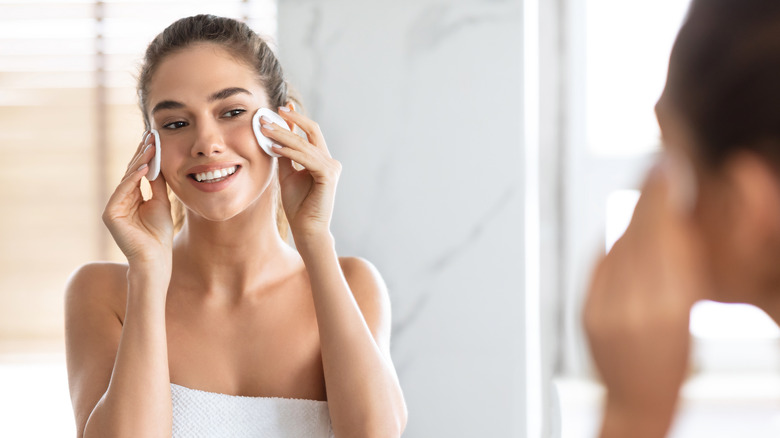How Rose Water Can Help Treat Your Acne
Roses are considered flowers of romance and beauty. For years, roses have been used in bath and skincare routines for the pleasing fragrance and nostalgia the flowers bring. A wide array of serums, cleansers, lotions, and creams all with rose oil extracts are currently available.
Roses water has been reported to host antimicrobial, antiseptic, anti-inflammatory, and astringent properties (per Healthline). According to a 2013 review, there are more than 3,000 species of the plant commonly known as "roses" and they offer an assortment of benefits.
Acne is caused when the pores on the skin become clogged with dirt, oil, and debris. The skin's inflammatory response causes a red and tender area around the pore (per University of Central Florida). Rose water, which is produced by immersing or steam-distilling rose petals in water, might be an efficient remedy for reducing the inflammation and redness associated with acne, according to Healthline. The astringent and antimicrobial properties might aid in the prevention of new breakouts with regular use.
How rose water may help
As Medical News Today points out, there's no concrete evidence that rose water is effective against acne. However, there is little risk in trying it, and there are reasons to believe it may work for some people. Rose water hosts a variety of benefits that might be able to help combat acne.
For example, acne can be painful due to inflammation in the skin. Rose water might offer a calming response which allows the reduction of inflammation and results in decreased pain. In fact, a 2020 study published in the Clinical Journal of Oncology Nursing examined the efficacy of a rose water solution as a mouth rinse for chemotherapy patients. The rose water solution proved effective at reducing tissue swelling in the mouth.
Second, the antiseptic and antibacterial properties of rose water can help cleanse the skin, according to Healthline. A simple rose water solution can be used to gently clean inflamed pores and pustules, removing bacteria without the harsh or abrasive effects sometimes experienced with other cleansing products.
Finally, rose water has been said to have astringent properties. It might help to tighten skin and shrink pores, which will reduce the risk of dirt, oil, and debris becoming trapped on the skin's surface. Compared to alcohol-based astringents, rose water is less likely to dry out your skin. However, Healthline warns that astringents can irritate skin and worsen breakouts for some people, and therefore recommends consulting a dermatologist before applying any astringent to your skin.
How to use rose water for acne
Rose water is a very mild and calming solution that can be incorporated easily into your skincare in a number of ways. It is gentle enough to be used daily in both your morning and nighttime routines.
Rose water can be used as a spot treatment, toner, and facial mist. To use rose water as a spot treatment, apply rose water on a cotton ball to your skin, gently pressing the cotton ball over the affected area. To use rose water as a toner, wash your face with a normal skin cleanser and then pat dry before rinsing your face with rose water, per Healthline. Alternatively, gently apply the rose water all over the face using a cotton pad, suggests Medical News Today. To use rose water as a facial mist, add some rose water to a spray bottle, close your eyes, and then spritz a bit of it onto your face. Healthline adds that this can relieve stress.
Unlike many other products, rose water is gentle enough to be left directly on the skin and does not require rinsing. Adding rose water as a step in your daily skincare routine might help reduce your acne and leave your skin feeling rejuvenated and refreshed.
If the treatment isn't effective, then Medical News Today recommends consulting a doctor about other options, especially if you have severe acne, which can lead to scarring.



